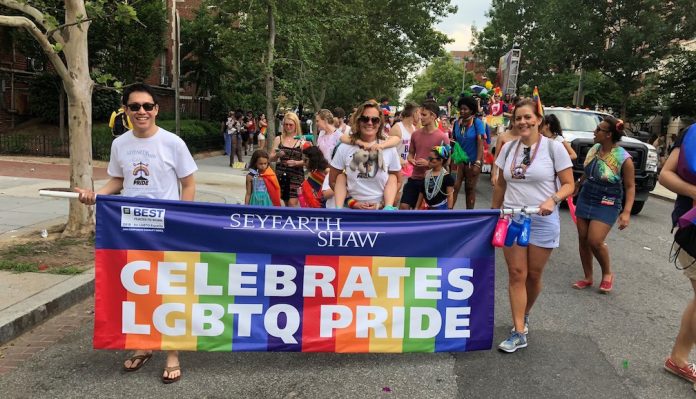[This story appears in the current March/April 2019 issue of Boston Spirit magazine. Subscribe for free today.]
Only a few years ago, equal pay for women, job opportunities for people of color, accommodations for the differently abled and antidiscrimination protections for all marginalized groups were front-and-center issues in the struggle for diversity and inclusion in the workplace.
Of course this all remains true. The struggle goes on.
However, in recent years many large corporations in New England have been hard at work developing policies and procedures to address these issues, and some of these companies in our region like Eastern Bank and Harvard Pilgrim Health Care started D&I initiatives as early as 25 years ago, simply because they recognized it was the right thing to do.
More recent progress has been facilitated through grassroots organizations like Freedom Massachusetts, the nonprofit geared toward bringing together advocates for transgender rights across a wide range of interests—from government agencies and law enforcement to faith leadership, educators, labor unions and the business community.
As a result, initiatives like the Massachusetts Freedom for Business Coalition were created. Launched in 2015, major corporations joined the coalition to endorse transgender rights and spread the word to their wide audiences of colleagues and customers. A year later, Governor Charlie Baker signed into law transgender protections, which were overwhelming defended against the referendum to roll them back at the ballot box last November.
As progress rolls forward in communities where corporations are based in and serve, the value of businesses better reflecting the people in these communities has become clearer.
Good for business
Winson Wang, a Boston-based corporate banking associate at TD Bank and New England chair of the bank’s LGBT business resource group, said his company strives to “recognize the differences among people, better understand each individual’s unique characteristics, and engage those differences to create a work culture of belonging and collaboration.”
This is very good business practice “because when someone is comfortable bringing their whole self to work, then it’s more likely that that person will contribute to the best of their abilities. And if everyone at the bank feels that way, then the organization ultimately benefits from all those people operating at their full potential,” Wang explained.
“This allows us to have more innovative solutions, more creative problem solving, and to share different viewpoints so that we can establish better, more robust practices here at the bank,” he said.
In other words, diversity and inclusion are very good for business.
Brains and passion
Having a more diverse workforce, of course, begins at the hiring stage.
At PTC, the global software and services technology company headquartered in Boston, a new employment initiative called “Hiring for Brains and Passion” was enacted in 2018. Kathy Cullen-Cote, vice president for human resources at PTC, described the program like this: “When you hire someone because they look and sound and have credentials just like everybody else, we know that doesn’t work. We wind up with people who just want to see a nail and grab a hammer and bang it in.”
So PTC trained “100 percent” of its managers across the globe on a new approach that includes a panel of diverse members of each team for every job description, and revamped their entire recruitment practices with an eye toward developing D&I at PTC.
Similarly, TD Bank is expanding its hiring pool to include “more diverse individuals who are reflective of the diverse communities that we serve,” said Wang. They do this through initiatives like job fairs, resume workshops and mentoring programs.
With major offices in Boston, the global law firm Seyfarth Shaw implemented a version of the NFL’s “Rooney Rule,” where teams must interview ethnic minority candidates for NFL senior-level positions, including head coach. Seyfarth’s policy, started in 2016, ensures that “at least one diverse candidate is interviewed for each associate opening,” said Kate Perrelli, a partner working from the firm’s Boston office. As a result, diverse hires among Seyfarth’s associates climbed to 44 percent in 2017. That same year, women of color and LGBT employees together made up 65 percent of Seyfarth’s associates and partners.
Employee resource groups
As corporations work toward including a more diverse workforce, they are also turning to their employees for guidance on policies and practices that foster diversity and inclusion and make the work environment more comfortable and productive.
Based in Boston for more than 200 years, the venerable financial services firm Brown Brothers Harriman has offices across six continents with a commitment to furthering its D&I policies in every corner of the globe, including less socially progressive regions around the world. According to Raymond Cyr, vice president working at the Boston headquarters, they do this largely through their Affinity Network Community, which includes 10 groups representing a rainbow of diversity from the Pride network of LGBTQ employees, to networks for people of color, women, “diverse ability allies,” parents, young professionals and a “global employee network” promoting multicultural awareness.
“These networks were created from the shared belief that we all benefit from a workplace where colleagues are comfortable being themselves. Employees with different backgrounds and interests come together to expand their knowledge, strengthen career skills and build new relationships through volunteer activities, networking sessions, and other events that promote global knowledge sharing and community building across the firm.”
Commonly known as ERGs, or employee resource groups, each of the corporations in this story are increasingly relying on them to help develop the policies and practices that enhance their workplaces and ultimately their bottom lines.
Ryan Trapani-Goldberg, a cofounder of the LGBT resource group at PTC, started working at the company about three years ago. He said they’d been an informal LGBT group that had met for lunch for about 20 years. Times had changed, and the people in it felt more comfortable “going public” by the time he’d come on the job.
As soon as they did, he said, no one looked back. His coworkers not only supported them but they asked for advice about LGBT family members and other questions that led to a more comfortable working environment. PTC’s branding department even created T-shirts for the group to wear at Pride parades and other events. Together, the ERGs developed a website for all employees to follow, so everyone can learn more about each other, share interests and build relationships.
Trapani-Goldberg and his husband and PTC colleague, Dan, marched in their first Boston Pride parade with PTC last year. “It was amazing,” he said. “So many LGBT employees marched together, but you know what? There were even more non-LGBT employees marching there with us. PTC is an amazing place to work. I encourage everyone working in other places to gather and form ERGs if they don’t already have them. It just feels great to come to work fully as you are.” [x]









